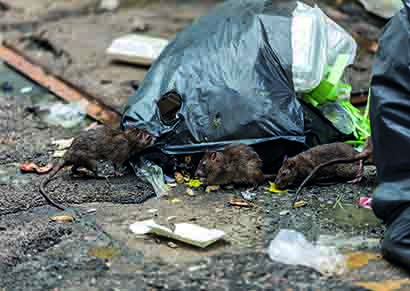
The BPCA reported that 51% of pest professionals polled had reported an increase in rat activity, while 41% reported an increase in mice activity during the timeline of restrictions.
According to the BPCA, empty buildings, deserted streets and reduced footfall provide an ideal opportunity for rodents to thrive across the UK, with rats and mice seemingly becoming bolder, braver and more innovative in finding food and shelter in the shutdown.
Natalie Bungay, the BPCA’s technical officer, said: “We’ve had reports of rats and mice infesting empty buildings and it seems their lifestyle patterns are changing.
“Rats in particular are also becoming more visible in areas of population. With less footfall across cities and towns there is less associated food waste being left in bins and on the floor.”
Ms Bungay added: “As a result, rat populations are likely to move further afield to satisfy their need for a food source and this, in turn, is likely to cause more sightings.
“By nature, rats will also try to avoid humans directly and so, with less of us walking the streets, they may be getting a little bolder and possibly be seen in areas they normally wouldn’t.”
Ms Bungay added that in these unprecedented times, we need to ensure that effective pest management is implemented.
“During the shutdown, as designated key workers, the professional pest management sector is working hard to protect homes, as well as key areas including healthcare environments such as hospitals, the food manufacturing industry, and farms too,” she said.
“Empty buildings also need to be managed. Rodents and many other pests carry and transmit diseases and can breed at an alarming rate if left unattended. They contaminate food, ruin stock and can even cause fires and floods with their gnawing.
“Pro-active pest management is the only way we can manage the risks to public health and safety.”



